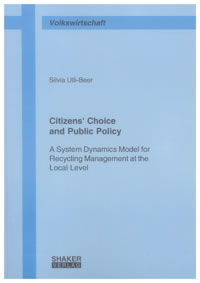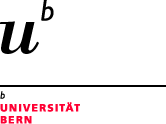Interfakultäre Koordinationsstelle für Allgemeine Ökologie (IKAÖ) |

Forschung
Managing for Sustainability: A Decision Support Model for Solid Waste Management
Dissertation project by:
Silvia Ulli-Beer
Supervisors:
Prof. Dr. M. Schwaninger, University of St. Gallen
Prof. Dr. R. Kaufmann-Hayoz, University of Berne
Period:
2000 - 2003
Abstract:
In the dissertation project both the "structures" in municipalities
and the ecologically relevant behavior of the inhabitants and their
interactions will be analyzed. The focus is on those structures
which are preconditions for individual responsible environmental
behavior, especially the restrictions and limitations of this behavior.
The scope of this project is the development of strategies which
are theoretically and empirically grounded, as well as instruments
and measures which support a sustainable development. Therefore
theories and knowledge from different disciplines must be taken
into account. The overall concept will be applied on the area of
solid waste management. Using a System Dynamics model the different
strategies will be simulated and analyzed in order to support the
political decision process. To investigate the municipality the
method of group model building (Vennix 1996) has been chosen. Some
group model building sessions were held to map the problematic causal
chains in the municipality. Experts from various fields (local government,
local administration, consulting firms serving the municipality
in the areas of energy, transportation, water/sewage, waste, and
consumption) shared their mental models about problems of environmental
policy in order to explain the main impediments for change on part
of citizens. The aim was to create among the experts a shared model
of the causes and consequences of problematic behavior of the inhabitants.
Based on the subjective models and different theories of human behavior,
an overall concept for responsible environmental behavior was synthesized.
This concept will be used to develop a System Dynamics model for
solid waste management in order to create a tool for strategic decision
making for the public administration and policy. The overall goal
of the solid waste policy is to avoid the generation of solid waste.
But today in the municipality the main task is the management of
the increasing amount of solid waste and to collect it for different
recycling processes. The underlying dynamic hypothesis of the problem
is: If there is no change in the supply and disposal structures
as well as in the consumption behavior of the inhabitants, the cost
of the solid waste management will increase further and the willingness
of the inhabitants for cooperation will decline (resistance against
increasing taxes, burning of solid waste in the backyard, littering,
wild waste site). Therefore the ecological and economical efficiency
of the solid waste policy will decline.
Quick Links
Publication
- Dr. Silvia Ulli-Beer:
"Lokale Strategien für eine nachhaltige Entwicklung - ein systemdynamisches Modell für das Abfallmanagement" (2006)

